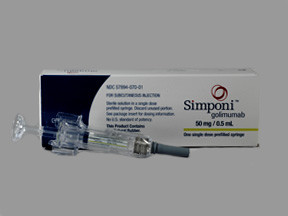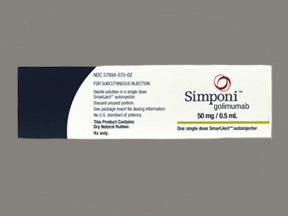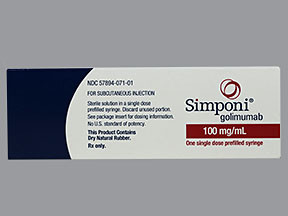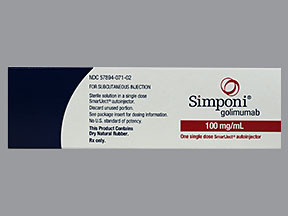GOLIMUMAB - SUBCUTANEOUS INJECTION
PHONETIC PRONUNCIATION: (goe-LIM-ue-mab)
COMMON BRAND NAME(S): Simponi
GENERIC NAME(S): golimumab
Uses
USES: This medication is used to reduce pain and swelling due to certain types of arthritis (such as rheumatoid, psoriatic, and ankylosing spondylitis). It works by blocking a protein (tumor necrosis factor or TNF) found in the body's immune system that causes joint swelling and damage. By reducing joint swelling, the medication helps to reduce further joint damage and preserve joint function. Depending on the type of arthritis that is being treated, this drug may be used alone or in combination with another drug called methotrexate. This medication is also used to treat a certain bowel condition (ulcerative colitis). It is used to help lessen symptoms of moderate to severe ulcerative colitis (such as abdominal pain/cramping, diarrhea, bloody stools).
How to use GOLIMUMAB - SUBCUTANEOUS INJECTION
HOW TO USE: Read the Medication Guide and Instructions for Use provided by your pharmacist before you start using golimumab and each time you get a refill. If you have any questions regarding the information, consult your doctor or pharmacist. Use this medication exactly as prescribed. This drug is given by injection under the skin of the thigh, abdomen, or upper arm as directed by your doctor, usually once a month. If you are using this medication to treat ulcerative colitis, your doctor may prescribe a different schedule/higher dose at the start of your treatment. Carefully follow your doctor's directions for using this medication. Learn all preparation and usage instructions in the product package. Never shake this product. Doing so may decrease the effectiveness of the drug. Remove this medication from the refrigerator and leave it at room temperature for 30 minutes before injecting. Do not warm up this medication any other way such as by heating in the microwave or placing in hot water. Before using, check this product visually for particles or discoloration. The liquid is usually colorless to pale yellow and may contain tiny particles that are white or that you can see through. If the liquid is any darker than pale yellow, if it is discolored in any other way, if it is cloudy, or if it contains large particles, do not use the liquid. Before injecting each dose, clean the injection site with rubbing alcohol. It is important to change the injection site with each dose. Do not inject into any areas of skin that are sore, bruised, red, scaly, or hard. If using an autoinjector, remove the cap before injecting this medication. Use this medication regularly to get the most benefit from it. To help you remember, mark the day on the calendar when you need to receive the medication. Learn how to store and discard needles and medical supplies safely. Never reuse syringes or needles. Consult your pharmacist. Tell your doctor if your condition persists or worsens.
Side Effects
Precautions
Interactions
Overdose
Images
Reviews
Warning
WARNING: This medication can decrease your body's ability to fight an infection. This effect can lead to very serious (possibly fatal) infections (such as fungal infections, bacterial infections including tuberculosis). Tell your doctor your medical history, especially of past/recent/current infections. You should also tell your doctor if you have lived or traveled in areas where certain fungal infections (such as coccidioidomycosis, histoplasmosis) are common or if you have been near someone with tuberculosis. Areas where these types of fungal infections are commonly found include the Ohio and Mississippi River valleys and the southwestern United States. Your doctor will test you for tuberculosis (TB) infection before and during treatment with this drug. If you are diagnosed with TB, your doctor will first prescribe treatment for this to prevent a serious TB infection while using golimumab. Though it is very unlikely to happen, there is a risk (especially in children/teens/young adults) of developing cancer (such as lymphoma, skin cancer) due to this medication or due to your medical condition. Discuss the risks and benefits of treatment with your doctor. Tell your doctor right away if you develop symptoms such as unusual lumps/growths, swollen glands, unexplained weight loss, persistent fever, or night sweats.
Disclaimer
IMPORTANT: HOW TO USE THIS INFORMATION: This is a summary and does NOT have all possible information about this product. This information does not assure that this product is safe, effective, or appropriate for you. This information is not individual medical advice and does not substitute for the advice of your health care professional. Always ask your health care professional for complete information about this product and your specific health needs.




No Reviews Yet